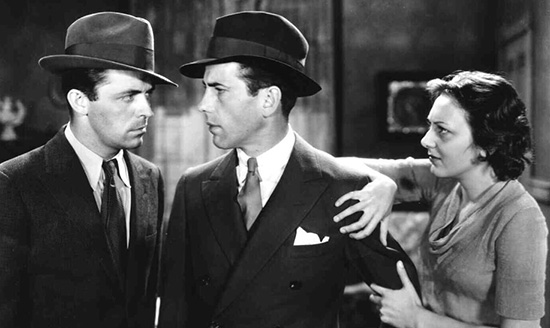Classic Hollywood: Pre-Code Busters

Regular readers of this blog know that I love “Pre-Code” films, those naughty little gems made between 1930 and 1934, when studios were in the risqué business of ignoring strict Motion Picture Production Code censorship…er, guidelines.
Two of my favorite Pre-Codes were released four months apart in 1932. Both deal with edgy themes that would be forbidden just two years later. Both have zippy running times south of an hour, giving them a propulsive energy. Both dive into the seamy underside of life with wild abandon. And both are worth a look, if only to make you realize, “My granny watched stuff like this?!”
Night World tracks the intersecting lives of folks in a mobbed up hot spot called “Happy’s Club.” Six months out from his iconic turn in Frankenstein, Boris Karloff is still plenty scary as the violent creep who runs the joint with his trifling wife, who’s cheating on him with George Raft. Mae Clarke, who gained instant immortality after James Cagney smushed a grapefruit in her face in The Public Enemy, plays a floor-show floozy who falls for a binge-drinking millionaire (Lew Ayres). Hedda Hopper, who later ditched acting to become a gossip columnist, is the rich boy’s “mother” of a mother.
The tale feels torn from the Warner Bros. gangster-pic playbook, yet it was produced by Universal, likely hoping to expand its monster-movies brand. Night World boasts a Busby Berkeley dance number with scantily-clad chorus girls, and a touching performance by African-American actor Clarence Muse as the nightclub’s doorman. Unlike most films of the era, Muse’s character is a fully fleshed-out person who shares friendships with Clarke and a white cop on the beat, so when he’s shot, Night World viewers feel the loss. See for yourself on YouTube.
Three on a Match revels in its racy Pre-Code plot. Infidelity? (Yep.) Kidnapping? (Sure.) Drug addiction? (Oh, hell yes!) Joan Blondell, Bette Davis, and Ann Dvorak scorch the screen as childhood pals whose lives careen from Park Avenue to the skids. Although Davis barely registers in an early role as a mousy blonde, Blondell cracks wise and Dvorak chews the scenery as a bored-socialite-turned-broke-cokehead. This speedy roller coaster ride clocks in at just 64 minutes, and like Night World, delivers a shocking finale that will leave you breathless.
My fellow blogger Laura Boyes at MovieDiva.com nails the prevailing production mindset at Warner Bros., which produced Match, during the 1930s: “No paying for swank literary properties, scripts ‘must have the punch and smash that would entitle it to be a headline on the front page of any successful metropolitan daily,’ said studio head Darryl Zanuck.”
Match is hard to find online, so here’s hoping you can catch it on TCM (Turner Classic Movies), or on the streaming platform of your choice.
Classic Hollywood posts appear bimonthly on The Music Hall blog.
